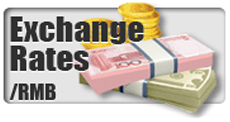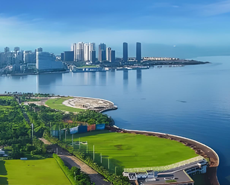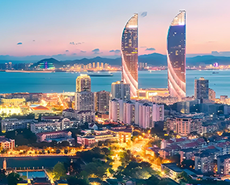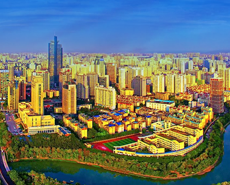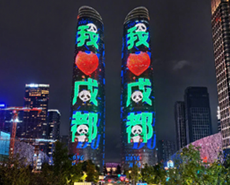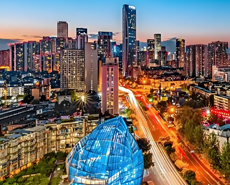Asian Metal: Good morning, Mr. Yu. Thank you for accepting this interview. Firstly, would you like to make a brief introduction about the background and the main business of your company?
Yu: Thank you. Taojiang Ruilong Metal New Material Co., Ltd. (hereinafter referred to as “Taojiang Ruilong”) which is jointly invested by Hunan Rare Earth Metal Material Research Institute and American Bloom Energy International (Asia) Co., Ltd, mainly produces scandium oxide, scandium-contained aluminum alloy, several varieties of scandium salts and others rare earth alloys. Currently, our main products are scandium oxide 99-99.999%min and scandium-contained aluminum alloy and several scandium salts. Meanwhile, we are researching scandium-contained aluminum alloy and some other rare earth alloy materials. Our annual capacities for scandium oxide and scandium-contained aluminum alloy are 5t and about 50t respectively, with an annual output of about 3 tonnes of scandium oxide in 2016.
Workshop 1 of Taojiang Ruilong
Workshop 2 of Taojiang Ruilong
Asian Metal: Thank you for your introduction and would you like to share your career experience with us?
Yu: I am the Chief Engineer in Hunan Rare Earth Metal Material Research Institute and assist management in industrial development at present. In addition, I am the general manager of Taojiang Ruilong.
Asian Metal: Can you let us know something about the production capacity and supply-demand in scandium oxide and scandium metal sectors. Limited by production costs, most producers for scandium oxide recycle scandium oxide from titanium dioxide waste acid and crystallization mother liquor of zirconium oxychloride. What’s the character of the two resources and are there some differences on the quality and prices of scandium oxide recycled from them? How about the usage condition of bauxite red mud, vanadium-titanium ore, titanium tetrachloride smoke, tungsten-manganese slag and other resources in recycling scandium?
Yu: With more producers for scandium oxide in the recent years, the production capacity for scandium oxide has increased substantially; however, the world economy or the application of scandium oxide hasn’t developed accordingly. As a result, the market of scandium series of material sees serious oversupply problem.
Our scandium resources are mainly from recycling titanium dioxide waste acid, crystallization mother liquor of zirconium oxychloride, tungsten slag and nickel-cobalt slag. Due to different extracting technologies and different contents for thorium (the impurity), recycling costs are different accordingly, with the cost of recycling scandium from titanium dioxide waste acid being relatively higher. The quality is also different as the quality grade settled by different enterprises is different.
Due to the serious oversupply problem, there are only several research units and enterprises which are engaged in the research on recycling scandium from bauxite red mud and other resources. That’s to say, the research on recycling scandium from bauxite red mud and other resources is limited.
Asian Metal: As for the oversupply problem in scandium oxide market, will there be some changes respectively in supply and consumption markets of Chinese scandium oxide throughout 2017?
Yu: Affected by several factors, the selling problem for scandium oxide in 2017 has become the most serious in the recent 7-8 years, which will force scandium products enterprises to face great challenges in the market. However, because market participants usually buy when prices increase while stop purchasing when prices slide, more purchasers will hold a wait-and-see attitude towards the market and will lay orders when prices decrease further or stop from decreasing. Thus, the scandium oxide market will weaken further. Many scandium enterprises will be in the semi-shutdown state and several of them will be forced to halt production completely.
Asian Metal: According to statistics from Asian Metal, prices for Chinese scandium oxide 99.99%min have declined from RMB29,000-30,000/kg in 2011 to RMB8,300-8,800/kg now. What do you think of the reasons caused the price decrease of rare earth products? How do you think of the market outlook in 2017?
Yu: The price decrease is decided by situation of supply and demand in the spot market. The demand for scandium oxide all over the world was less than 20t in 2011 and the annual demand has still been less than 50t in the recent years although it has increased. However, the annual capacity of China has been more than 50t with production lines with total annual capacity of tens of tonnes under construction now; as for the overseas production, Russia has kept stable production and a company in Japan has begun to operate its production lines to recycle scandium. Thus, the oversupply and the price decrease problems will be hard to be solved in the near future. The key to solve the problems is to expand the application areas of scandium to stimulate the increase of demand.
Asian Metal: You have mentioned that Taojiang Ruilong is jointly invested by Hunan Rare Earth Metal Material Research Institute and America BE Company and what do you think of the demand for scandium oxide from solid oxide fuel cell (SOFC) in 2017?
Yu: Considering estimations in several respects, I think that the demand for scandium oxide from SOFC area will decline substantially throughout 2017 to only one fourth of the annual demand in the previous years.
Asian Metal: That’s a bad news! So prices for scandium oxide are decreasing continuously and are gradually closed to the production cost line, which makes profits of producers shrink constantly. As a major producer for scandium oxide in China, how do you think scandium producers will face challenges? Is it to cooperate together to avoid price decrease or just to lower prices to stimulate the consumption of downstream consumers?
Yu: Thank you for your appreciation. Generally speaking, the situation of supply and demand is decided by the market. Under the almost unchanged demand and the serious oversupply, prices for scandium oxide are inevitable to decline. It is necessary for producers to manager or control production costs to adapt to the condition in the spot market. Producers shall anchor more hope on the substantially increased demand caused by lowering of production costs, to make scandium-contained products apply in defense and civil areas especially in civil area which owns large volumes of customers who can accept production costs. Once it is realized, demand for scandium oxide will make great breakthroughs in increasing and producers can make profits through enlarging production and selling scales.
Meanwhile, what I want to emphasize is that scandium is an element which hasn’t been discovered in sole ore in nature with all resources coming from the recycling from other associated ores. Most scandium resources will be discharged with wasted water once they are not recycled instantly and the possibility to recycle them later is very low. It is a pity to waste the previous resource. Thus, to promote the application of scandium oxide is a way to make scandium oxide resources contributed to human being instead of to be wasted for nothing. As a producer for scandium oxide, we are responsible to this and we also appeal to our government to list scandium oxide into strategic reserves and to spend RMB150 million in reserving about 20t of scandium oxide as strategic reserves per year or to make adjustments in the market, which is of great significance.
Asian Metal: Scandium-contained aluminum alloy, SOFC and scandium-sodium lamp are the three main application areas for scandium oxide. What do you think of the growth potential of scandium oxide in scandium-contained aluminum alloy area? Is it possible to see breakthroughs in the demand of the material in both home and abroad?
Yu: In fact, the characters such as ultra-lightness and ultra-strength owned by scandium-contained aluminum alloy make it be applied widely. Besides aerospace materials, scandium-contained aluminum alloy can be applied in many others such as all varieties of thin plates, pipelines, vessels, light boats and electrical appliances. High production cost is one of main factors to limit the application of scandium. Due to the great ability in environmental protection and mobility, the application of SOFC is also very wide with great potential, but it also has the problem related with production cost and the production technology also needs to be improved. In addition, the application on scandium-sodium halogen lamp won’t see great breakthroughs.
Asian Metal: How about the production condition of Taojiang Ruilong? Would you like to tell us something about your plan in business or development?
Yu: Based on the adverse market condition, Taojiang Ruilong is conducting maintenance and technology upgrading on production lines. We will control our total production in 2017 and pay more attentions to adjust product structure and expand market.
Asian Metal: Thank you once again for sharing your views with and offering your supports to Asian Metal. We wish your company a better future!
Yu: Thank you!



